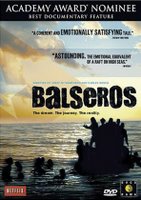
By avoiding the conniving tactics and overly slanted attitudes that have plagued so many politically minded documentaries of the past few years, and in doing so allowing its human elements to speak for themselves (and all the more clearly because of it),
Balseros proves to be an illuminating breath of fresh air. The title refers to the Cuban immigrants who attempted to enter the United States during the 1990’s via rafting from their homeland to Florida, a dangerous task that left many dead when the unpredictable ocean waters destroyed their tiny vessels. With U.S. discourse on the subject lacking any form of empathy or real knowledge as to the state of living in Cuba, these refugees are regularly seen as miscreants who exist only to rupture the United States economy;
Balseros watches with unflinching realism the decrepit Cuban society that provides happiness but little in the way of opportunity (very much exacerbated by the U.S. embargo, which succeeds more in lowering the standards of living than in placing any real political pressure on premier Fidel Castro). Ultimately, the only thing that separates the U.S. citizens from the Cuban balseros is the formers luck of being born in the States in the first place.
Balseros follows the stories of several individuals rooted in the “balseros crisis” (as it came to be known), some of whom are separated from their family, some who never get the opportunities they strive for so diligently. The filmmakers make no judgments or impose no opinions on the directions these people take over the years, some finding happiness upon reaching America and others remaining in just as much an economic rut in the new capitalist economy as in their homeland Cuba. Whilst certainly reflective of major social and political strains present in this divide,
Balseros is most effective in portraying the perseverance of the human spirit under the crushing circumstances of an unaccommodating society.




 By avoiding the conniving tactics and overly slanted attitudes that have plagued so many politically minded documentaries of the past few years, and in doing so allowing its human elements to speak for themselves (and all the more clearly because of it), Balseros proves to be an illuminating breath of fresh air. The title refers to the Cuban immigrants who attempted to enter the United States during the 1990’s via rafting from their homeland to Florida, a dangerous task that left many dead when the unpredictable ocean waters destroyed their tiny vessels. With U.S. discourse on the subject lacking any form of empathy or real knowledge as to the state of living in Cuba, these refugees are regularly seen as miscreants who exist only to rupture the United States economy; Balseros watches with unflinching realism the decrepit Cuban society that provides happiness but little in the way of opportunity (very much exacerbated by the U.S. embargo, which succeeds more in lowering the standards of living than in placing any real political pressure on premier Fidel Castro). Ultimately, the only thing that separates the U.S. citizens from the Cuban balseros is the formers luck of being born in the States in the first place. Balseros follows the stories of several individuals rooted in the “balseros crisis” (as it came to be known), some of whom are separated from their family, some who never get the opportunities they strive for so diligently. The filmmakers make no judgments or impose no opinions on the directions these people take over the years, some finding happiness upon reaching America and others remaining in just as much an economic rut in the new capitalist economy as in their homeland Cuba. Whilst certainly reflective of major social and political strains present in this divide, Balseros is most effective in portraying the perseverance of the human spirit under the crushing circumstances of an unaccommodating society.
By avoiding the conniving tactics and overly slanted attitudes that have plagued so many politically minded documentaries of the past few years, and in doing so allowing its human elements to speak for themselves (and all the more clearly because of it), Balseros proves to be an illuminating breath of fresh air. The title refers to the Cuban immigrants who attempted to enter the United States during the 1990’s via rafting from their homeland to Florida, a dangerous task that left many dead when the unpredictable ocean waters destroyed their tiny vessels. With U.S. discourse on the subject lacking any form of empathy or real knowledge as to the state of living in Cuba, these refugees are regularly seen as miscreants who exist only to rupture the United States economy; Balseros watches with unflinching realism the decrepit Cuban society that provides happiness but little in the way of opportunity (very much exacerbated by the U.S. embargo, which succeeds more in lowering the standards of living than in placing any real political pressure on premier Fidel Castro). Ultimately, the only thing that separates the U.S. citizens from the Cuban balseros is the formers luck of being born in the States in the first place. Balseros follows the stories of several individuals rooted in the “balseros crisis” (as it came to be known), some of whom are separated from their family, some who never get the opportunities they strive for so diligently. The filmmakers make no judgments or impose no opinions on the directions these people take over the years, some finding happiness upon reaching America and others remaining in just as much an economic rut in the new capitalist economy as in their homeland Cuba. Whilst certainly reflective of major social and political strains present in this divide, Balseros is most effective in portraying the perseverance of the human spirit under the crushing circumstances of an unaccommodating society.




